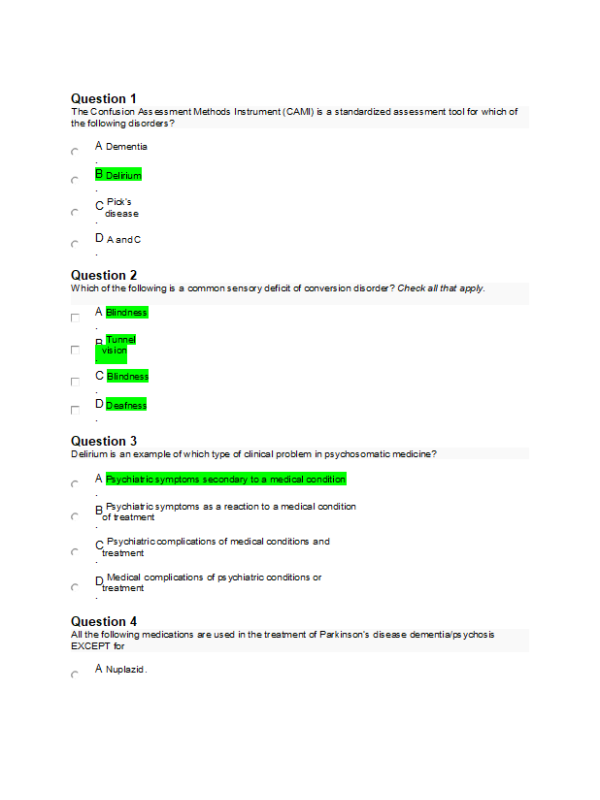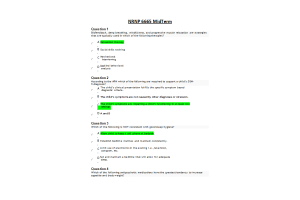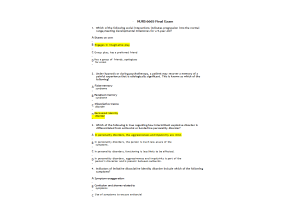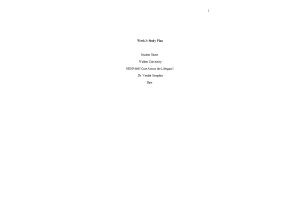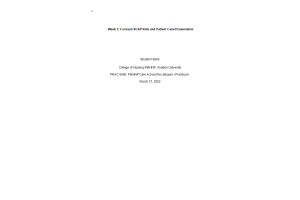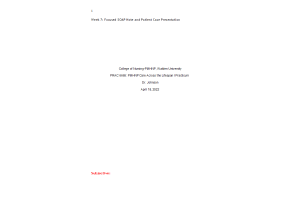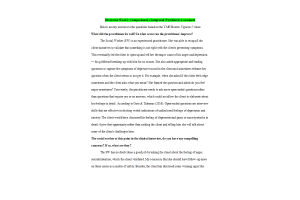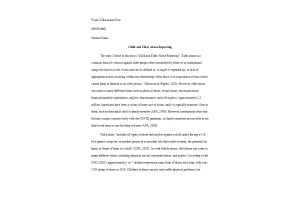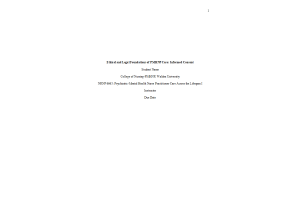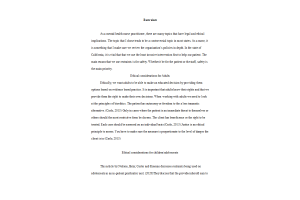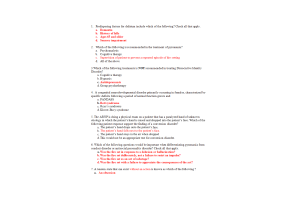NURS 6665 Week 11 Final Exam (100% Correct Spring QTR)
- $49.00
1.Question: The Confusion Assessment Methods Instrument (CAMI) is a standardized assessment tool for which of the following disorders?
2.Question: Which of the following is a common sensory deficit of conversion disorder? Check all that apply.
3.Question: Delirium is an example of which type of clinical problem in psychosomatic medicine?
4.Question: All the following medications are used in the treatment of Parkinson’s disease dementia/psychosis EXCEPT for
5.Question: Indicators of imitative dissociative identity disorder include which of the following symptoms?
6.Question: Which of the following can lower a person’s resistance to control impulses?
7.Question: Schizophrenia in a patient with end-stage renal disease is an example of which type of clinical problem in psychosomatic medicine?
8.Question: An acute onset, short-term confusion, with changes in cognition and level of awareness due to a physiological cause is known as which of the following?
9.Question: A patient expresses feelings of unreality or of being detached from their environment, describing the perception of the outside world as unreal, dreamlike, and visually distorted. The ARNP recognizes this as which of the following?
10.Question: A patient presents with persistent feelings of detachment from one’s self, like watching one’s self in a movie. The ARNP recognizes this as which of the following?
11.Question: Which of the following is recommended in the treatment of pyromania?
12.Question: Which of the following biological factors have been associated with kleptomania? Check all that apply.
13.Question: A neuro developmental disorder characterized by impairment confined to a specific area of academic achievement (i.e., reading, writing, arithmetic, spelling) without deficits in intellectual and adaptive behaviors is
14.Question: Which of the following approaches/treatments are recommended in working with patients with a conversion disorder?
15.Question: Experiences of depersonalization and derealization are common in which of the following patients?
16.Question: Under hypnosis or during psychotherapy, a patient may recover a memory of a painful experience that is etiologically significant. This is known as which of the following?
17.Question: Which of the following is recommended as a first line therapy for a patient with dementia and behavioral disturbance?
18.Question: According to the DSM-5, delirium is specified as acute or persistent. Which of the following time frames is consistent with acute delirium specification?
19.Question: Which of the following is true about impulses? Check all that apply.
20.Question: MRI findings in patients with intermittent explosive disorder may reveal changes to which area of the brain that is associated with loss of impulse control?
21.Question: Patients with kleptomania have a high lifetime comorbidity of which of the following disorders?
22.Question: The epidemiology related to kleptomania includes which of the following?
23.Question: An increase in depersonalization is seen with the depletion of which of the following?
24.Question: Depression secondary to interferon treatments represents which of the following clinical problems in psychosomatic medicine?
25.Question: The ARNP is meeting with a person who reports a fascination with fire, along with recurrent deliberate and purposeful setting of fires. The ARNP realizes that these behaviors are consistent with which of the following disorders?
26.Question: Which of the following is not consistent with what is known about depersonalization and derealization?
27.Question: Which of the following are included in the clinical features of anxiety illness disorder? Check all that apply.
28.Question: The ARNP in working with a parent of a 6-month-old would offer which of the following in anticipatory guidance?
29.Question: Thesymptomofgivingapproximateanswersisknownaswhichofthefollowing?
30.Question: Identifying developmental milestones is an important skill set for ARNPs for which of the following reasons?
31.Question: Which of the following can cause delirium? Check all thatapply.
32.Question: A patient who has been raped, presents with the inability to recall important personal information and any information about the rape, does recall events prior and since. There does not appear to be any physiological reason for this. This presentation is consistent with which of the following diagnoses?
33.Question: A term use to describe a neurodevelopmental disorder characterized by impairments in reciprocal social communication and a tendency to engage in repetitive stereotyped patterns of behaviors, interests and activities is
34.Question: Acute withdrawal from alcohol represents which type of clinical problem in psychosomatic medicine?
35.Question: A dissociative disorder described as an identity disturbance due to prolonged and intense coercive persuasion is known as which of the following?
36.Question: Discrete episodes of losing control of aggressive impulses grossly out of proportion to any stressors, which can result in serious assault tor destruction of property are symptoms consistent with which of the following disorders?
37.Question: Epidemiologydatasuggestswhichofthefollowingwithrespecttoillnessanxietydisorder?
38.Question: Which of the following treatments is NOT recommended in treating Dissociative Identity Disorder?
39.Question: A person reveals to the ARNP that they steal to get the things they want and cannot afford. The person says they just can’t help themselves, because they have kleptomania. The ARNP realizes the following:
40.Question: A subcortical dementia with parenchymal abnormalities which can be visualized on MRI is known as which of the following?
41.Question: Predisposing factors for delirium include which of the following? Check all thatapply.
42.Question: Which of the following diagnostic instruments for Autism Spectrum Disorder is recommended for universal clinical practice?
43.Question: A capacity evaluation prior to an organ transplantation is an example of which of the following clinical problems in psychosomatic medicine?
44.Question: A temporary marked alteration in the state of consciousness or by the customary sense of personal identity without the replacement by an alternate sense of identity is known as which of the following?
45.Question: Which of the following is consistent with current literature about the relationship between obstetrical complications and Autism Spectrum Disorders (ASD)?
46.Question: A major neuro cognitive disorder with severe impairment in memory, judgment, orientation, and cognition is known as which of the following?
47.Question: Difficulty with immediate memory is attributed to impairment in which of the following regions of the brain? Select all that apply.
48.Question: Which of the following would not be included in the treatment plan for a patient with illness anxiety disorder?
49.Question: Which of the following would demonstrate the normal achievement of gross motor developmental milestone for a 6-month-old?
50.Question: A process by which repressed material is brought back to consciousness and the person relives the repressed material accompanied ty the appropriate affective response.
51.Question: The term psychosomatic literally refers to which of the following?
52.Question: Which of the following is consistent with normal range gross motor developmental milestones for a 4 year old?
53.Question: Which of the following speech and language skills are consistent with normal developmental milestones of a 3-year-old?
54.Question: Which the following medications is used to treat irritability inautism?
55.Question: A congenital neuro developmental disorder primarily occurring in females, characterized by specific deficits following a period of normal function growth and development is
56.Question: Which of the following are included in the five different milestone skill areas that should be evaluated?
57.Question: Recognizable skills or abilities that have an expected range and order of appearance such as a child taking his first step around the time of his first birthday is known as which of the following?
58.Question: A condition characterized by the person giving approximate answers, with clouding of consciousness, frequently accompanied by hallucinations or other dissociative, somatoform or conversion symptoms is
59.Question: Somatoform disorders represent which type of clinical problem in psychosomatic Medicine?
60.Question: Which is NOT consistent with what is known about Gansersyndrome?
61.Question: The second-most common type of dementia caused by cardiovascular and cerebrovascular disease with progressive cognitive decline in stepwise fashion is known as which of the following?
62.Question: Deficits in attention and the ability to complete multi-step commands are associated with impairment in which of the following regions of the brain?
63.Question: A person erroneously believes they sustained an emotional or physical trauma in early life is known as which of the following?
64.Question: Persons who continually use the internet to play games to the extent that it interferes with social relations and work performance are exhibiting symptoms most specifically consistent with which of the following conditions?
65.Question: A new diagnosis in the DSM-5 characterized by persons preoccupied with being sick or developing a disease of some kind is known as which of the following?
66.Question: A subcortical dementia characterized by motor abnormalities including psychomotor slowing,choreoathetoidmovements,executivedysfunctioncomplicatedbyimpaired language, memory, and insight later in the disease process is
67.Question: Which of the following is a common visceral symptom of conversion disorder?
68.Question: The ARNP is working with the family of a patient with Alzheimer’s Disease who keeps stating the family is plotting against her, trying to have her “snuffed out.” The family is distraught because they state they are doing their best to make sure their family member is safe. The ARNP explains which of the following in educating the patient about the patient’s
69.Question: Which of the following questions would be important when differentiating pyromania from schizophrenia?
70.Question: The ARNP notices that a patient with a conversion disorder unable to walk has an inappropriately cavalier attitude toward what seems to be a major impairment and recognizes this an associated psychological symptom known as which of the following?
71.Question: The ARNP recognizes which of the following when the 2-month-old opens her mouth when she sees a bottle.
72.Question: Neuropsychiatric testing is defined as which of the following?
73.Question: Deficits in language including naming, repetition, reading and comprehension, and writing is NOT associated with impairment in which of the following regions of the brain?
74.Question: A sudden unexpected purposeful travel away from home with inability to recall all of one’s past accompanied by confusion about personal identity not due to direct effects of a substance or a general medical condition which causes clinically significant distress or impairment in social, occupational, or other important areas of functioning is most specifically known as which of the following?
75.Question: Visual hallucinations are associated with impairment in which of the following regions of the brain?
76.Question: Theprincipaltheoreticiantobringpsycheandsomatogetherwaswhichofthefollowing?
77.Question: Which of the following medications are FDA-approved medications for the treatment of delirium?
78.Question: Anxiety related to chemotherapy is an example of which type of clinical problem in psychosomatic medicine?
79.Question: A type of delirium characterized by cycling through psychomotor agitation and retardation, from apathy to hyper vigilance is known as which of the following?
80.Question: A tension state that can exist without an action is known as which of the following?
81.Question: Which of the following is true regarding how intermittent explosive disorder is differentiated from antisocial or borderline personality disorder?
82.Question: A tension state that always has an action component is known as which of the following?
83.Question: A cognitive assessment should include which of the following?
84.Question: The ARNP evaluates a 4-year-old who cannot balance on one foot for 3 seconds, cannot copy a circle and realizes which of the following?
85.Question: Which of the following adaptive skills are consist with normal range developmental milestone of an 18-month-old?
86.Question: A disorder characterized by the presence of two or more distinct identities which differ from each other in that each presents as having its own pattern of perceiving, relating to, and thinking about the environment and self.
87.Question: Interest in fires and deliberate setting of fires for financial gain is known as which of the following?
88.Question: Which of the following conversion disorder symptoms are associated with a good prognosis?
89.Question: A type of delirium characterized by psychomotor retardation and apathy is known as which of the following?
90.Question: Which of the following symptoms assist in differentiating a seizure from a pseudo seizure
91.Question: Which of the following questions are recommended to assess sexual identity in a male adolescent?
92.Question: Which of the following demographics are consistent with autism spectrum disorder(ASD)
93.Question: The diagnosis formerly known as multiple personality disorder is now known as which of the following?
94.Question: Which of the following is NOT consistent with what is known about intermittent explosive disorder across the lifespan?
95.Question: Functional neurological symptoms disorder is also known as which of the following?
96.Question: Which of the following would be a developmental trigger for a 3-year-old? Check all that apply.
97.Question: Which of the following questions would be important when differentiating pyromania from conduct disorder or antisocial personality disorder? Check all that apply.
98.Question: The therapeutic approach that has the best chance of success for the person with intermittent explosive disorder is which of the following?
99.Question: Which of the following are common disorders that must be differentiated from dissociative identity disorder? Check all that apply.
100.Question: Which of the following is an example of a medical complication of psychiatric conditions or treatment?
